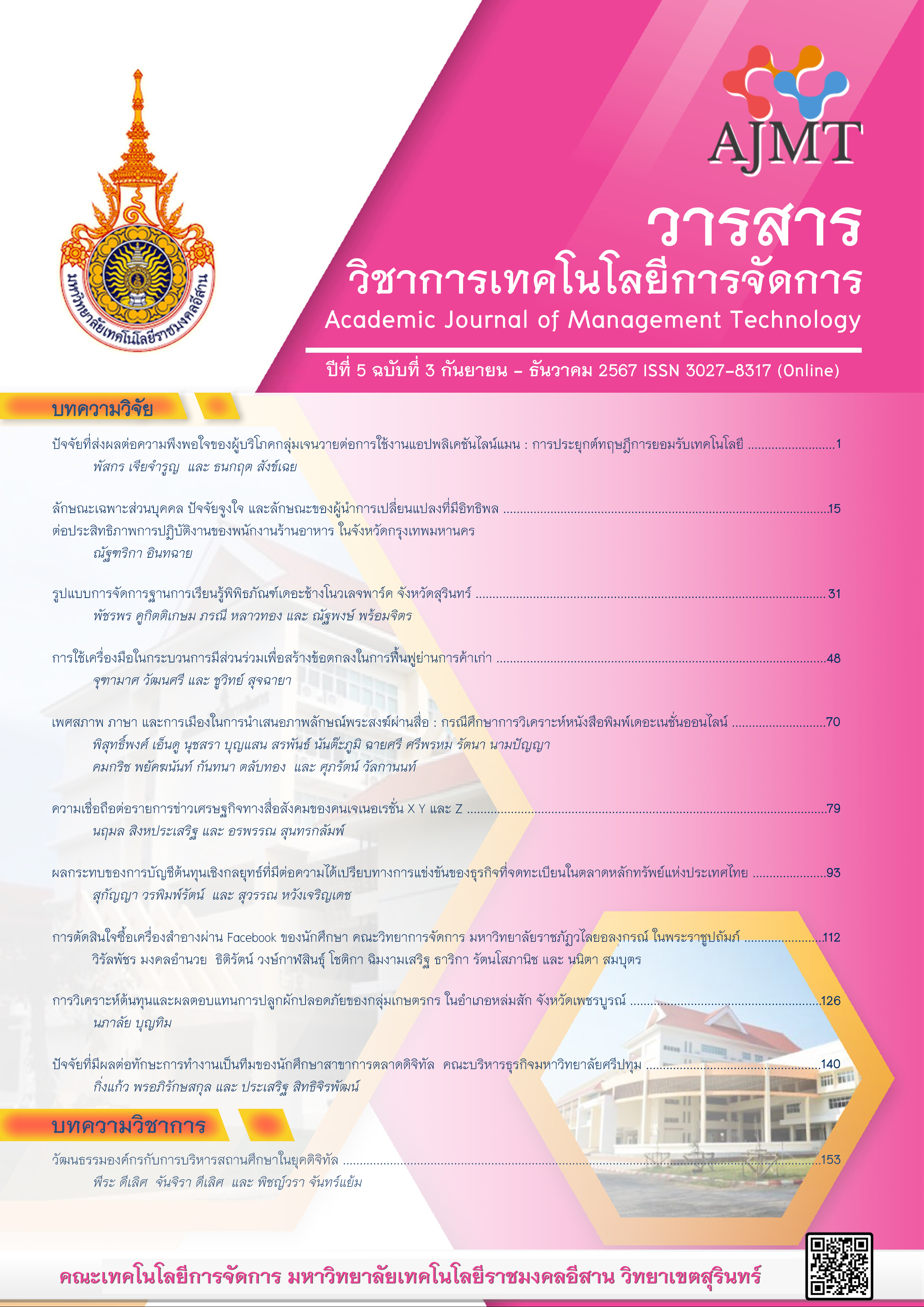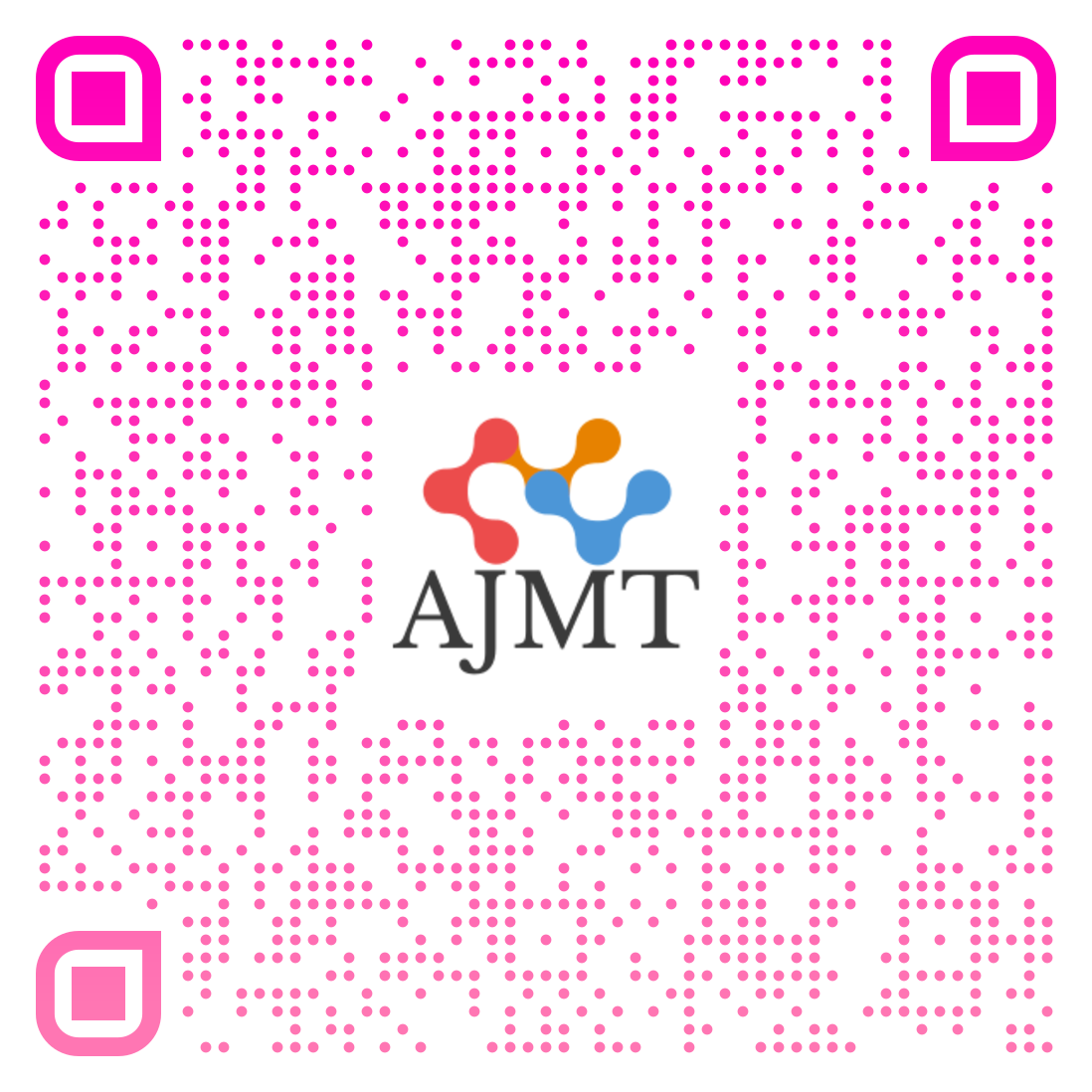รูปแบบการจัดการฐานการเรียนรู้พิพิธภัณฑ์เดอะช้างโนวเลจพาร์ค จังหวัดสุรินทร์
DOI:
https://doi.org/10.14456/ajmt.2024.24คำสำคัญ:
เดอะช้างโนวเลจพาร์ค, พิพิธภัณฑ์, รูปแบบการจัดการฐานการเรียนรู้บทคัดย่อ
การวิจัยครั้งนี้มีวัตถุประสงค์ 1) เพื่อพัฒนารูปแบบการจัดการฐานการเรียนรู้พิพิธภัณฑ์เดอะช้างโนวเลจพาร์ค จังหวัดสุรินทร์ 2) เพื่อศึกษาผลการใช้รูปแบบการจัดการฐานการเรียนรู้พิพิธภัณฑ์เดอะช้างโนวเลจพาร์ค จังหวัดสุรินทร์ โดยเปรียบเทียบความรู้ก่อนและหลังเข้าชมพิพิธภัณฑ์เดอะช้างโนวเลจพาร์ค จังหวัดสุรินทร์ 3) เพื่อศึกษาความพึงพอใจ ของนักท่องเที่ยวที่มีต่อรูปแบบการจัดการฐานการเรียนรู้พิพิธภัณฑ์เดอะช้างโนวเลจพาร์ค จังหวัดสุรินทร์ กลุ่มตัวอย่าง ได้แก่ นักท่องเที่ยวที่เข้าชมพิพิธภัณฑ์เดอะช้างโนวเลจพาร์ค จังหวัดสุรินทร์ จำนวน 50 คน โดยการเลือกแบบเจาะจง เครื่องมือที่ใช้ในการวิจัยเป็นแบบสอบถาม มีค่าความเชื่อมั่น 0.87 สถิติที่ใช้ในการวิเคราะห์ข้อมูล ได้แก่ ค่าร้อยละ ค่าเฉลี่ย ส่วนเบี่ยงเบนมาตรฐาน และการทดสอบค่าที (t-test) ผลการวิจัยพบว่า 1) ผลการพัฒนาและหาประสิทธิภาพรูปแบบ การจัดการฐานการเรียนรู้พิพิธภัณฑ์เดอะช้างโนวเลจพาร์ค จังหวัดสุรินทร์ พบว่า การพัฒนารูปแบบที่สร้างขึ้นโดยสังเคราะห์กับแนวคิดทฤษฎีที่ใช้สำหรับการสร้างรูปแบบ มีขั้นตอนการพัฒนารูปแบบ 5 ขั้นตอน และประสิทธิภาพของรูปแบบการจัดการฐานการเรียนรู้พิพิธภัณฑ์เดอะช้างโนวเลจพาร์ค จังหวัดสุรินทร์ ได้ค่าประสิทธิภาพ 80.00/89.50 2) ผลการใช้รูปแบบการจัดการฐานการเรียนรู้พิพิธภัณฑ์เดอะช้างโนวเลจพาร์ค จังหวัดสุรินทร์ โดยเปรียบเทียบความรู้ก่อนและหลังเข้าชมพิพิธภัณฑ์เดอะช้างโนวเลจพาร์ค จังหวัดสุรินทร์ พบว่า ผลการเรียนรู้หลังเข้าชมสูงกว่าก่อนเข้าชม อย่างมีนัยสำคัญทางสถิติ ที่ระดับ 0.05 และ 3) ความพึงพอใจของนักท่องเที่ยวที่มีต่อรูปแบบการจัดการฐานการเรียนรู้พิพิธภัณฑ์เดอะช้างโนวเลจพาร์ค จังหวัดสุรินทร์ พบว่า นักท่องเที่ยวมีความพึงพอใจในภาพรวมอยู่ในระดับมากที่สุด
เอกสารอ้างอิง
Best, J. W. (1986). Research in education (5th ed.). Prentice Hall, Inc.
Buakhom, S. (2565). Development of essay writing exercise package based on mind mapping for matthayomsuksa 4 students at Chiangsaen Wittayakom school, Chiang Saen District, Chiang Rai Province [Master’ s thesis, Chiang Rai Rajabhat University]. https://tdc.thailis.or.th/tdc/dccheck.php?Int_code=7&RecId=3003&obj_id=34006&showmenu=no&userid=0
Chalermrakchart, C. (2017). Satisfaction of Thai tourists with Wat Rong Khun Chiang Rai Province [Master’ s thesis, Bangkok University]. Thai digital collection. http://dspace.bu.ac.th/handle/123456789/3062
Chanchotchuang, M. (2014).Approach to museum communication of the Chang Knowledge Park, Surin Province [Master’ s thesis, Silpakorn University]. http://www.thapra.lib.su.ac.th/thesis/showthesis_th.asp?id=0000011244
Chitchayawanit, K. (2562). Learning management. Chulalongkorn University.
Chintham, R. (2018). Development of an environmental learning management model based on the philosophy of sufficiency economy of the natural agriculture network [Doctoral dissertation, Valaya Alongkorn Rajabhat University].
https://grad.vru.ac.th/VRU_Thesis/thesis/file_pdf/full_54M74740118.pdf
Choosungkit, A. (2564). Development of instructional model for English Language reading comprehension for undergraduate students of Bansomdejchaopraya Rajaphat University based on active reading and cooperative learning techniques [Doctoral dissertation, Burapha University]. https://tdc.thailis.or.th/tdc/search_result.php
DASTA. (2019). Community-Based Tourism. Bangkok : Designated Areas for Sustainable Tourism Administration.
Deloitte University. (2020). Respond, recover, thrive an evolving perspective on the economic impacts of COVID-19. Deloitte University Press.
Disara, T. (2019). Development of a virtual museum on Thungwa Ancient Elephant, Satun Province [Master’ s thesis, Thaksin University] https://tdc.thailis.or.th/tdc/dccheck.php?Intcode=56&RecId=3953&obj_id=32880&showmenu=no&userid=0
https://www.krungsribizonline.com. (2021). Thailand’s business and industry trends. Krungsri Research.
Jerawang, C. (2020). Local museum management with community participation and development : Case study of Khun Lahan Local
Museum [Master’ s thesis, Thammasat University]. https://digital.library.tu.ac.th/tu_dc/frontend/Info/item/dc:183138
Kongchai, I. (2022). Context - based learning management. Journal of Corporate Management and Local Innovation, 8(6), 100 - 102.
Niyomsap, N. (2564). Basic knowledge of teaching and learning. Silpakorn University.
Padkaew, N. (2021). Model and processes of managing the elderly school in Lampang Province. Journal of Nakhon Lampang Sangha College, 9(1), 43 - 58.
Phuangnak, P. (2565). Teaching guide for general studies course on social entrepreneurship, higher education social entrepreneurship program. SET SOCIAL IMPACT.
Pimsin, J. (2565). The development communicative English listening and speaking competency by using simulation tactic for Pratomsuksa 5 students [Master’ s thesis, Rajabhat Maha Sarakham University]. https://tdc.thailis.or.th/tdc/dccheck.phpInt_code=34&RecId=9111&obj_id=61318&showmenu=no&userid=0
Powell, K. C. & Kalina, C. J. (2009). Cognitive and social constructivism : Developing tools for an effective classroom. Education, 130(2), 241 - 250.
Songcharoen, W. (2017). Developing a virtual museum format to increase learning efficiency and user experience of the national museum [Doctoral dissertation, Chulalongkorn University]. https://digital.car.chula.ac.th/cgi/viewcontent.cgiarticle=2965&context=chulaetd
Srikraiyut, C. (2016). Tourist satisfaction with the local museum, Wat Fang Khlong (Thai Phuan), Ko Wai Subdistrict, Pak Phli District, Nakhon Nayok Province [Master’ s thesis, Thammasat University]. https://digital.library.tu.ac.th/tu_dc/frontend/Info/item/dc:139502
Worabarunkul, T., Nilkote, R., Sirasatanan, P., & Mulmanee, S. (2018). Learning management model for 21st century student is skills development according the learning and innovation skill of schools in the eastern region [Unpublished research project]. Raphaibarni Rajabhat University.
World Bank Group. (2021). Thailand economic monitor : Restoring incomes; recovering jobs. World Bank.
ดาวน์โหลด
เผยแพร่แล้ว
รูปแบบการอ้างอิง
ฉบับ
ประเภทบทความ
สัญญาอนุญาต
ลิขสิทธิ์ (c) 2024 คณะเทคโนโลยีการจัดการ มหาวิทยาลัยเทคโนโลยีราชมงคลอีสาน วิทยาเขตสุรินทร์

อนุญาตภายใต้เงื่อนไข Creative Commons Attribution-NonCommercial-NoDerivatives 4.0 International License.
บทความที่ได้รับการตีพิมพ์เป็นลิขสิทธิ์ของคณะเทคโนโลยีการจัดการ มหาวิทยาลัยเทคโนโลยีราชมงคลอีสาน วิทยาเขตสุรินทร์
ข้อความที่ปรากฏในบทความแต่ละเรื่องในวารสารวิชาการเล่มนี้ เป็นความคิดเห็นส่วนตัวของผู้เขียนแต่ละท่านไม่เกี่ยวข้องกับคณะเทคโนโลยีการจัดการ มหาวิทยาลัยเทคโนโลยีราชมงคลอีสาน วิทยาเขตสุรินทร์ และคณาจารย์ท่านอื่นๆในมหาวิทยาลัยฯ แต่อย่างใด ความรับผิดชอบองค์ประกอบทั้งหมดของบทความแต่ละเรื่องเป็นของผู้เขียนแต่ละท่าน หากมีความผิดพลาดใดๆ ผู้เขียนแต่ละท่านจะรับผิดชอบบทความของตนเองแต่ผู้เดียว










